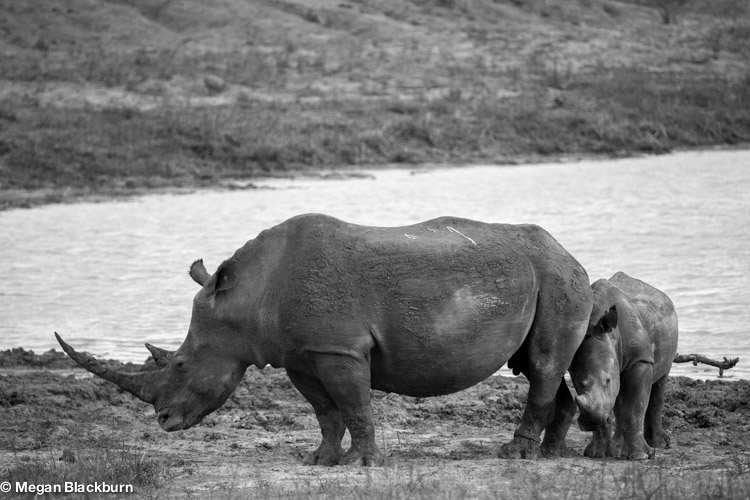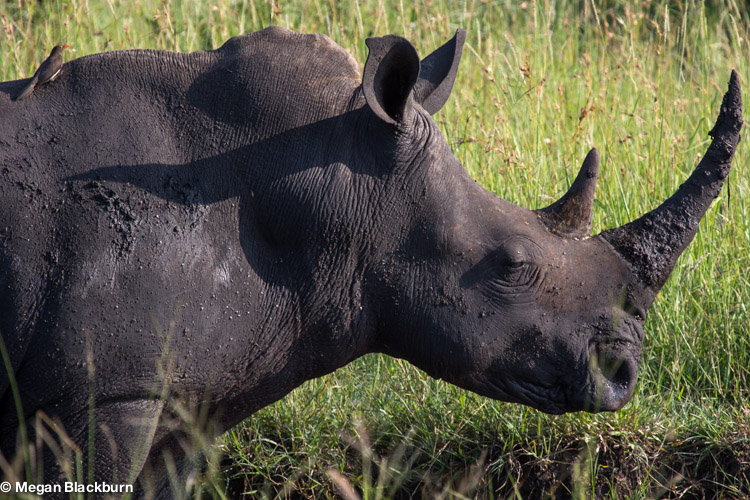
Disappearing Rhinos
South Africa remains one of the best places in the world to see rhinos. In fact, nearly all of the white rhinos in South Africa are direct descendants of a small herd that was discovered in KwaZulu Natal in the late 19th century when they were believed to have been hunted to extinction. Rhinos are under threat again. In late January the South African government announced that 1,215 rhinos had been poached in 2014, a 21% increase over 2013 and double the number poached in 2012. Currently there are an estimated 19,000 white rhino and 1,800 black rhino in South Africa. While this may sound like a sizable number, the poaching rate in South Africa almost equals the rhino birth rate. And, this could be the year that the number of rhinos lost outstrips the ones born, putting rhinos on a precipitous path to extinction.
The rise in rhino poaching is largely fueled by escalating demand in Asia and poverty across Africa. Across parts of Asia, rhino horn is believed to be an aphrodisiac, to cure cancer, and is generally viewed as a status symbol amongst the rising middle class. Despite only being made up of keratin (similar to human fingernails), rhino horn fetches $30,000 a pound on the black market, roughly the same price as cocaine. Rhinos are often shot, their horns gruesomely hacked off, and left to bleed to death. The gory stories from South Africa seem to be endless. This week I read a devastating story about a private game farm with an anti-poaching team. Just after sunset a cow with a month old calf was shot in the lungs. Apparently it is difficult to mobilize wildlife response teams and administer veterinary care at night, so the farm had to wait until a team arrived in the morning. Then in the early morning, the wounded mother led her calf out of the thicket to where the team was waiting, let the calf suckle, collapsed, and died.
South Africa is grappling with how best to contain the crisis. Two of the large safari operators, including & Beyond are relocating rhinos from South Africa to Botswana (Rhinos without Borders) where anti-poaching laws are stronger. The country has formed a task force to examine the legalization of the sale of rhino horn. Trophy hunting is extremely controversial and while I disagree completely with wanting to shoot a rhino, some argue if properly managed it can inject conservation projects with much needed capital, but research does not support this view. There are organizations dedicated to awareness that allegedly spend more money on campaigns than are donated to protection. In Johannesburg, many cars are adorned with red plastic horns and stickers exhorting others to save the rhino. There are no easy answers to rhino poaching and like many issues, a truly tenable solution needs to address thorny issues like poverty, local and transnational crime, and worldwide corruption.
The U.S. forms part of the story too. Most Americas will only see rhinos, elephants, and other African animals in zoos. As we stand in front of a pen holding a solitary rhino, maybe two or three, we read the placard describing rhino behavior followed by a blurb on how loss of habitat and poaching has led to dwindling numbers across the continent and for a moment, we are saddened that in a few years rhinos could be extinct. Then we feel lucky that we get to see these incredible animals in a zoo. It’s a completely inane reaction and yet understandable given that most Americans don’t expect to ever see a rhino in any place other than a zoo. We move on to the next animal in a cage. But, our country is the second largest market for illicit wildlife trafficking in the world and punishment for having rhino horn is a mere slap on the wrist – a fine and/or minimal jail time.
While poaching crops up in the news frequently in South Africa, the crisis was still on my periphery until last June. Like most things until something directly or indirectly affects you, it remains off your radar. Then last year, when I was a guest at & Beyond’s Ngala Tented Camp, I learned a mother and her calf were poached near the camp. Ngala is a private concession within Kruger and therefore shares an unfenced border with Kruger, where the vast majority of South Africa’s rhinos live and where poaching is endemic. It was an unwelcome baptism into the sordid world of animal poaching. During my stay at Ngala, I was fortunate enough to have a game ranger who is passionate about rhino conservation and founded an organization, Our Horn is NOT Medicine, dedicated to raising awareness and money for anti-poaching efforts.
Until that trip rhino poaching had seemed tangential to my life, but it became very real after my stay at Ngala.





Megan,
A great post. Thanks.
Randy